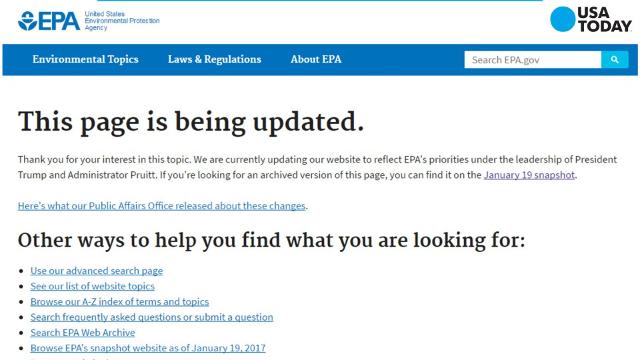https://www.nytimes.com/2017/04/29/world/europe/leeches-russia-medicine.html An article from the NYT about the uses of leeches in medicine. In the US, the FDA has licensed the use of leecges to remove excess blood from severed body parts that have been re-attached. In Russia they are used as a preventative for stroke and heart disease. Leech venom is a natural anticoagulant.

https://www.usatoday.com/story/news/politics/2017/04/29/epa-removes-climate-change-data-other-scientific-information-website/101072040/ From USA today a report that the EPA is removing its climate change data from its website with a view towards "reflecting the views of the leadership of the agency."

http://www.philly.com/philly/health/health-news/Five-Questions-about-blue-light-smartphones-ipads-iphones-sleep-optometric.html This is an article from the Inquirer about eye problems associated with excessive exposure to light in the blue range from computers and other devices. Concerns are about the propensity of excessive exposure to blue light causing eye strain, blurred vision, dry eyes. A survey by the American Optometric Association reveals that although 88% of Americans are aware of the fact that their vision can be harmed by the overuse use of these devices, they keep using them. To quote from the article, "The AOA has several recommendations. First of all, the association urges patients to follow the 20-20-20 rule. When you’re looking at a screen, take a 20-second break and look at something at least 20 feet away every 20 minutes."
https://www.nytimes.com/2017/05/03/sports/want-to-make-more-baskets-science-has-the-answer.html?_r=0 This is an article from the NYT about throwing more accurately. A paper published in Royal Society Open Science discusses the trade-off between throwing fast and throwing accurately and concludes that throwing fast makes it harder to release the object at just the right moment. But, the study additionally concludes that the ball release speed affects the curvature of the path that the ball takes. The conclusions were based on mathematical modeling.

https://www.nytimes.com/2017/04/24/well/family/fending-off-math-anxiety.html This is an opinion by Perry Klass about math anxiety in children. The doctor opines that, in order to instill number confidence in children it is important that early math skills be developed by parents talking to their children about numbers early in life much as they introduce their children to letters and the alphabet as a preliminary to learning to read. There is a program called "Bedtime Math" an app that presents short numerical problems to children. A 2015 study determined that children's math skilled improved if their parents used this program with them compared to a control group.

https://www.nytimes.com/2017/05/01/health/artificial-nose-scent-disease.html From the NYT an article about a company called Owlstone, which manufactures chemical sensors. Although the company originated with the purpose of detecting chemical weapons and explosive, the focus has shifted to medical sensors, specifically cancer detection. They are currently conducting a trial with the University of Warwick, to detect colon cancer from urine samples.

https://www.nytimes.com/2017/05/07/us/politics/epa-dismisses-members-of-major-scientific-review-board.html?_r=0 An article from the NYT about the dismissal of at least 5 members of a major scientific review board which advised the EPA. Scott Pruitt intends for the EPA to become much more lenient towards the coal industry, contradicting the recommendations of both of the EPA;s scientific review boards. Both of the review boards have been the subjects of political attacks. A Republican senator from Texas says that the advisors will be replaced with members from "the business world."

https://www.scientificamerican.com/article/aspirin-may-prevent-cancer-from-spreading-new-research-shows/ This is an article in the SciAm about aspirin's actions in preventing malignancies. work done at Brigham and Women's Hospital has shown that platelets help malignant cells to spread and that cancer cells use platelets to hide from the immune system. Aspirin is able to "re-wire" megakaryocytes (progenitor cells of platelets) to turn of genes that allow platelets to camouflage cancer cells. This latter work was done at Duke University.

http://www.samefacts.com/2017/05/energy-the-environment/the-wall-street-cherry-picking-festival/ Here is a column called "The Wall Street Cherry-Picking Festival" about the second column by Bret Stephens, the "climate confusionist" hired by the NYT. The blogger criticizes the Times columnist for picking the only year in a data trend showing emissions in Germany that was an outlier, when emissions fell. The blog shows the comparable data chart for US, which show the same decrease for the year in question.
https://www.nytimes.com/2017/05/04/science/julius-youngner-dead-salk-polio-vaccine-researcher.html?_r=0 An obit in the NYT for Julius Youngner, co-inventor with Jonas Salk, of the polio vaccine. These early immunologists were really heroes.

No comments:
Post a Comment